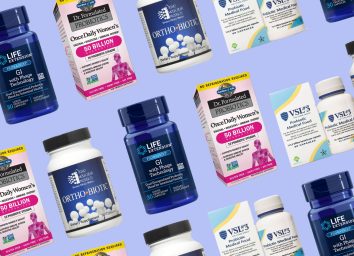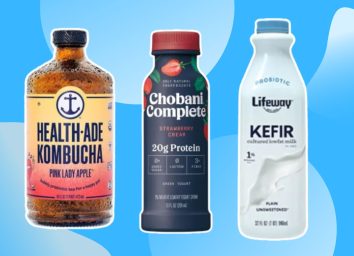What Happens To Your Body When You Start Taking Probiotics
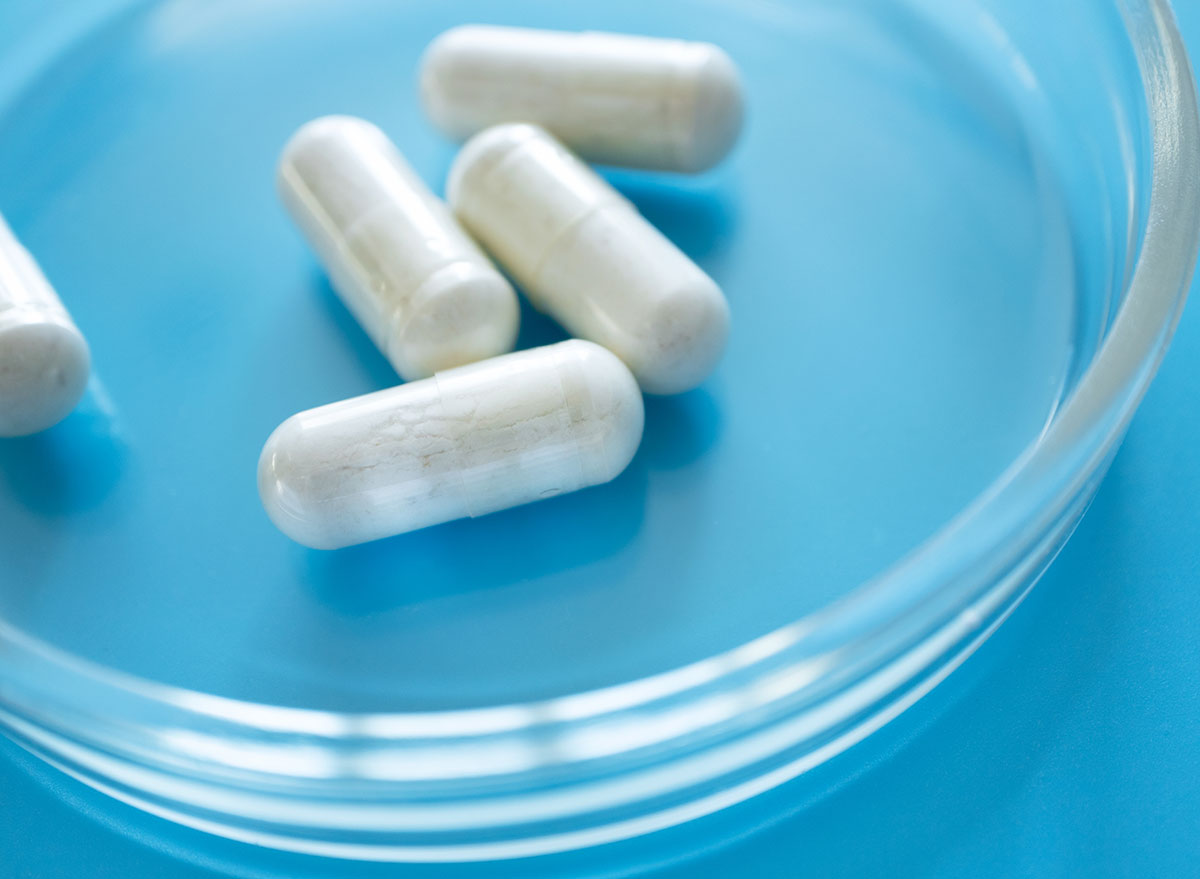
Whether you know it or not, there are trillions of little critters living in your gut—and consuming a solid amount of "good" bacteria to balance out the bad is key to your overall health. But what happens to your body when you start taking probiotics? The short answer is: a lot. These living microscopic organisms can improve digestion, keep your immune system in tip-top shape, control inflammation, help breakdown and absorb certain medications, and even positively affect your mood. But we'll get into all the nitty-gritty details below.
If you're not getting enough probiotics in your own diet from fermented foods such as kimchi, kefir, sauerkraut, yogurt, tempeh, and kombucha, then taking a supplement is a super easy and effective way to stay healthy. Dr. Josh Axe, a clinical nutritionist, founder of Ancient Nutrition, and author of Ancient Remedies, recommends taking probiotic capsules on an empty stomach, either when you first wake up or right before bed (roughly 2 to 3 hours after your last meal), which will allow them to work faster while minimizing any potentially negative side effects.
Dr. Axe says that some of the particular groups who may benefit from taking probiotics are those with GI or nutrient absorption issues or poor blood sugar management. But the truth is, almost anyone can benefit from probiotics.
There are many different kinds of probiotics, and choosing the right one for you will depend on your goals. For example, certain types have been found to be effective for treating eczema, while others are well-suited to people with irritable bowel syndrome. It's always a good idea to talk to your doctor before starting probiotics. That way, your provider can advise you about whether taking probiotics may be helpful for you, and if so, which supplements may be safe and effective based on your current health concerns.
Whether you just started adding probiotics to your diet or you're still in the research phase, here are some physical effects you need to know about. And for even more healthy tips, be sure to check out our list of The 7 Healthiest Foods to Eat Right Now.
You may experience less constipation.
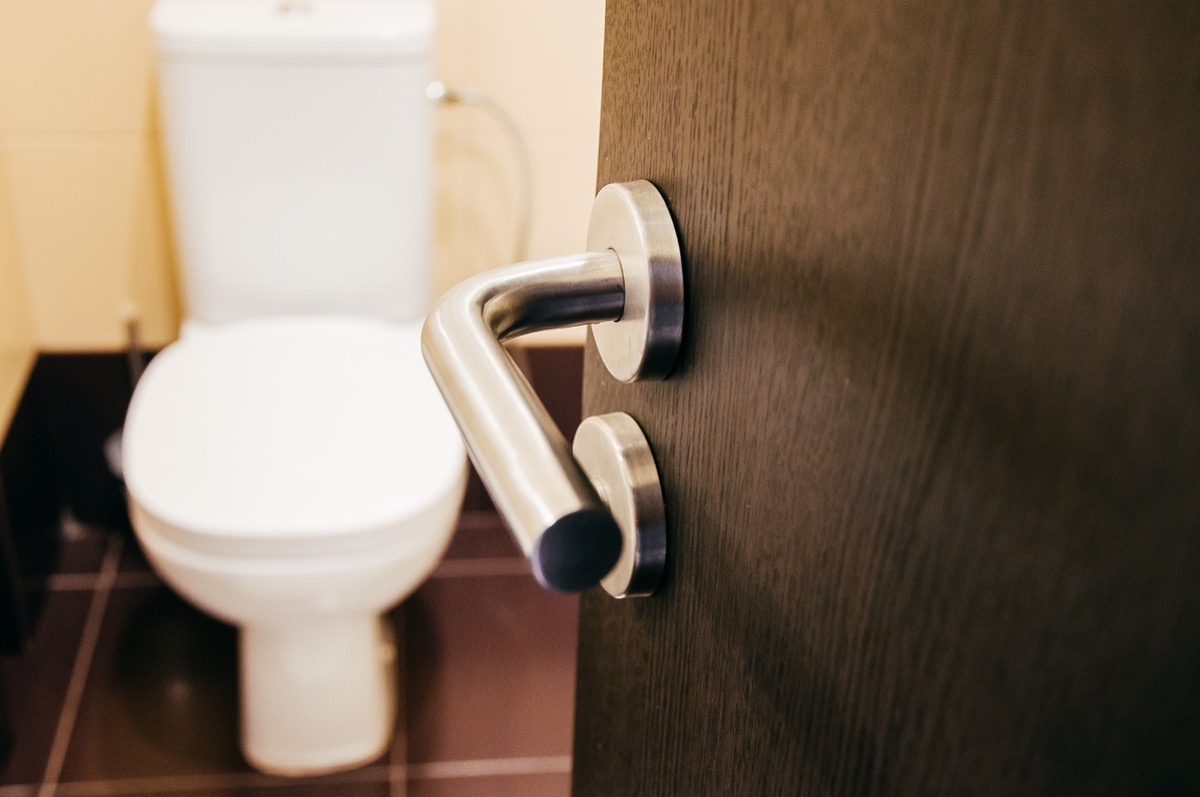
According to Morgyn Clair, RD, a registered dietitian nutritionist with Sprint Kitchen, one of the top benefits of taking probiotics is that they help your body break down and metabolize nutrients in the intestines more efficiently. As a result, they may promote regular bowel movements and reduce unpleasant GI problems like constipation and diarrhea. Specifically, Dr. Axe says the species of Lactobacillus or Bifidobacterium tend to be most helpful in this regard.
2017 research suggested that probiotic supplements can help cure antibiotic-associated diarrhea, while another study revealed that probiotics containing Bifidobacterium slowed "gut transit time," thus increasing participants' number of weekly bowel movements while softening stools, making them easier to pass.
Related: No, Probiotics and Prebiotics Aren't the Same Thing After All
Your immune system will likely get stronger.
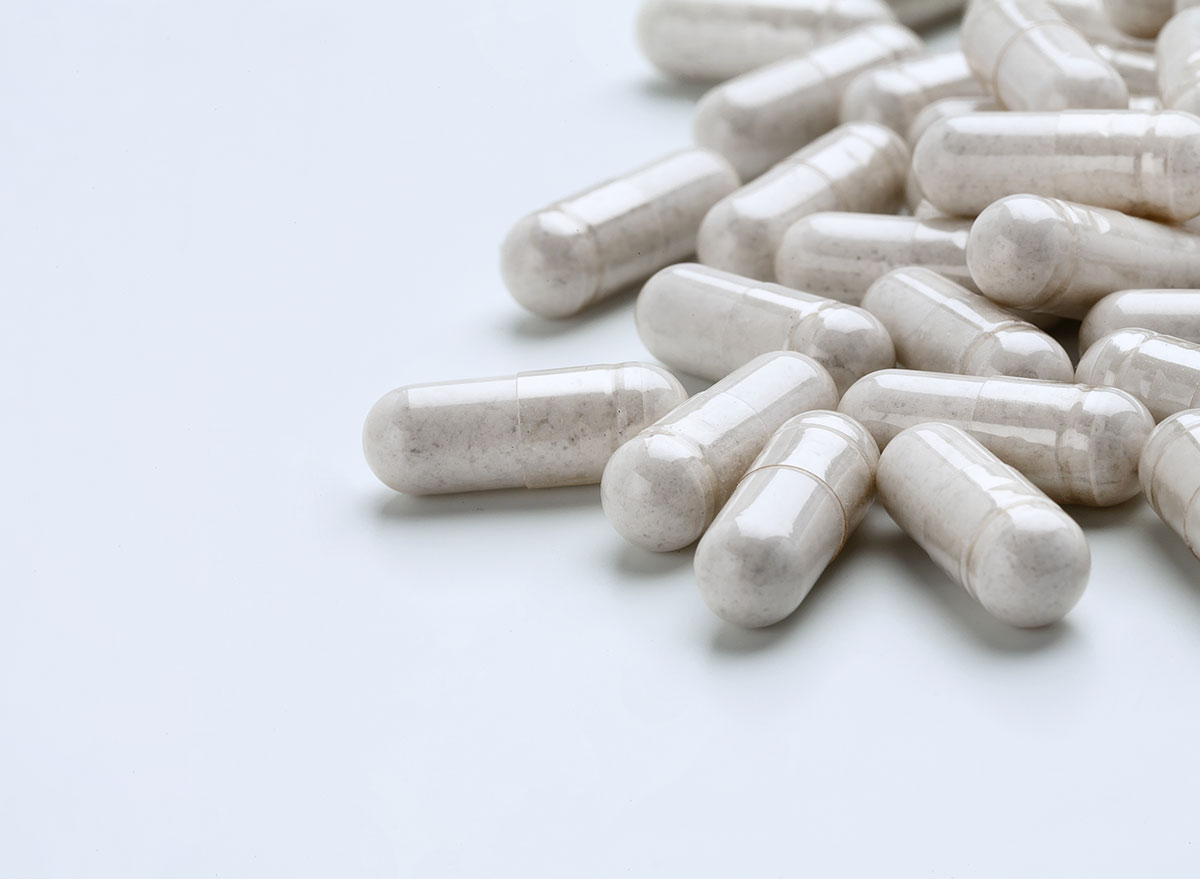
Don't be surprised if you find yourself coping with fewer cases of the sniffles often once you start taking probiotics. Studies have shown that several probiotic strains can enhance immune function, possibly resulting in a reduced risk of upper respiratory infections—including those that cause the common cold.
"Up to 80% of the immune system is housed in the gut," explains Dr. Axe. "Some types of probiotic formulas can also support a healthy inflammation response, another key aspect of immune health. In addition to crowding out bad microbes, probiotics help us create and use certain enzymes and nutrients that are needed to defend against harmful bacteria."
Dr. Axe notes, however, that some people who have immune deficiency disorders or who are being treated for cancer should not use probiotics without a doctor's help, since this can potentially be dangerous.
Get even more healthy tips straight to your inbox by signing up for our newsletter.
You might have some temporary bloating.

Most people do not experience negative side effects when taking probiotics—but some may notice a brief increase in bloating and gas. The good news is, experts say this is only temporary while your body adjusts to the new influx of good bacteria you've been introducing. According to Dr. Axe, these side effects will typically go away after several weeks of use, but if they don't, Clair says you might want to reduce your dosage. You should also consult your doctor for their advice.
"It's best to start with a low dosage and gradually increase as your body adjusts, which can help to prevent issues like loose stools," adds Dr. Axe. "If you're still dealing with reactions a month or so later, consider trying a different probiotic formula altogether."
You'll have an easier time maintaining a healthy weight.
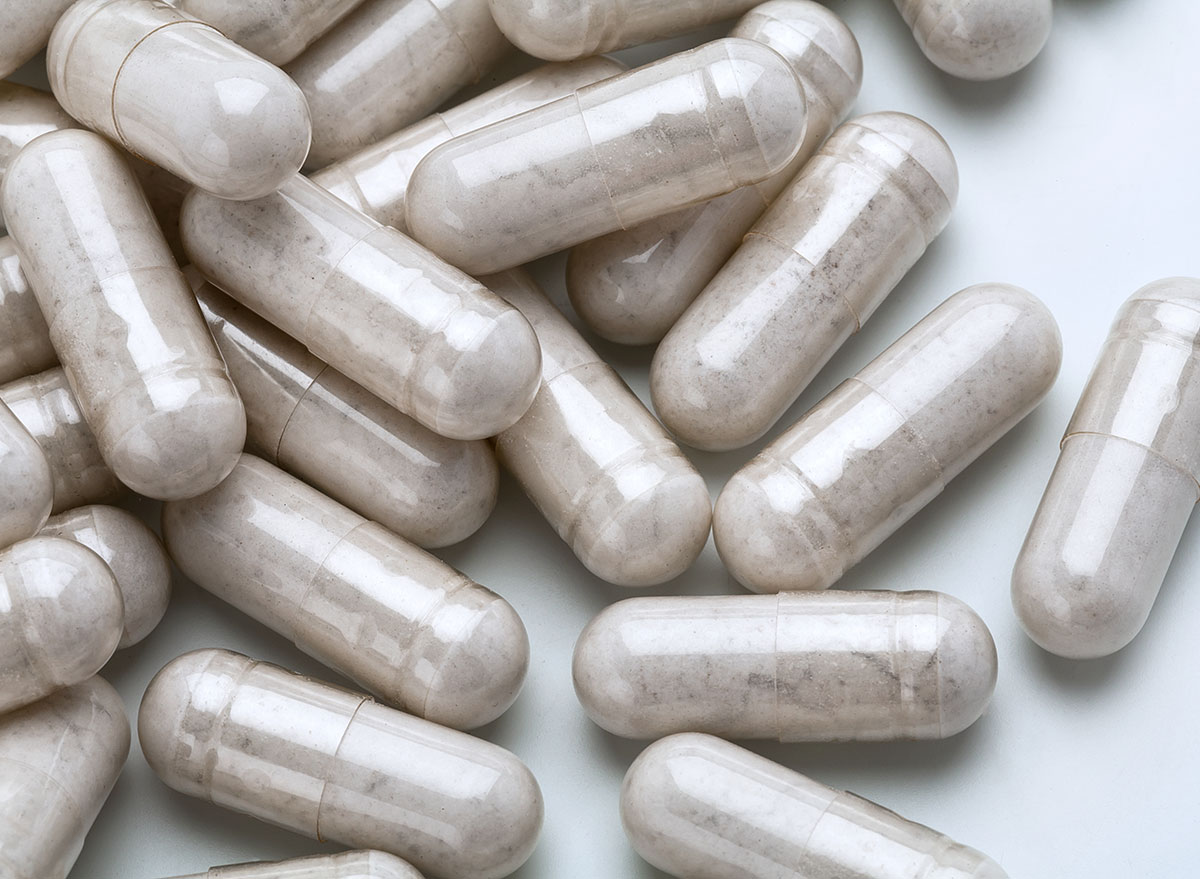
If you're trying to slim down, taking probiotics isn't a bad idea. While experts agree these supplements are certainly not a "magic bullet" for weight loss, they can aid in your efforts.
"Certain probiotic strains help boost muscle mass and strength, while also supporting healthy weight management and exercise recovery through several different mechanisms," explains Dr. Axe. "Probiotics seem to support a healthy body weight and body composition in several ways, including by improving insulin sensitivity, decreasing autoimmune response found in people with diabetes, helping to regulate one's appetite, supporting absorption of nutrients that help fuel muscles and organs, and supporting liver and kidney health which are needed for detoxification, and regulating fat storage."
According to Dr. Axe, certain probiotics can actually inhibit the absorption of dietary fat and increase the amount of fat excreted in bowel movements.
There's an ever-increasing amount of research to support this. For example, a 2013 study found that when women who were dieting took a probiotic supplement, they shed more pounds than women who took a placebo pill—and continued to lose more weight after they finished their diet. Another 2013 study found that when people drank fermented milk products with Lactobacillus gasseri bacteria, they lost 8.2– 8.5% of their belly fat over the course of 12 weeks.
Here are the 5 Best Probiotic Supplements For Weight Loss.
Your mood may improve.

Did you know that your brain and your gut and your brain are connected? That explains why supplementing your diet with certain strains of probiotics may actually improve your mood and overall mental health. In fact, research has demonstrated that these supplements may actually help people to better cope with mental stress, loneliness, and grief relating to the COVID-19 pandemic. Specifically, the probiotic strains Lactobacillus helveticus and Bifidobacterium longum have been found to reduce symptoms of depression and anxiety.
Don't forget to skim through the 18 Best Probiotic Products For Gut Health.
You might have more energy.

Not only might your mood get a lift from taking probiotics, but Dr. Axe notes that you may also find you have increased energy and less fatigue.
"Probiotics play a role in neurotransmitter production, including serotonin, which has mood-boosting and calming/sleep-promoting effects," he explains. "Some also contribute to cognitive health by helping to facilitate a healthy inflammation response and supporting nutrient absorption, which helps fuel normal brain activity."
Research has revealed that chronic fatigue syndrome is linked to an imbalance in the microbiome—which can cause "leaky gut syndrome." Basically, this means that bacteria enter the blood, triggering an immune response. Fortunately, research has also proven that taking probiotics may be useful for restoring balance to the microbiome and thus, alleviating fatigue and other symptoms.
You can also get a good amount of probiotics in your diet when you incorporate these 14 Probiotic Foods for a Healthy Gut into your meals!
